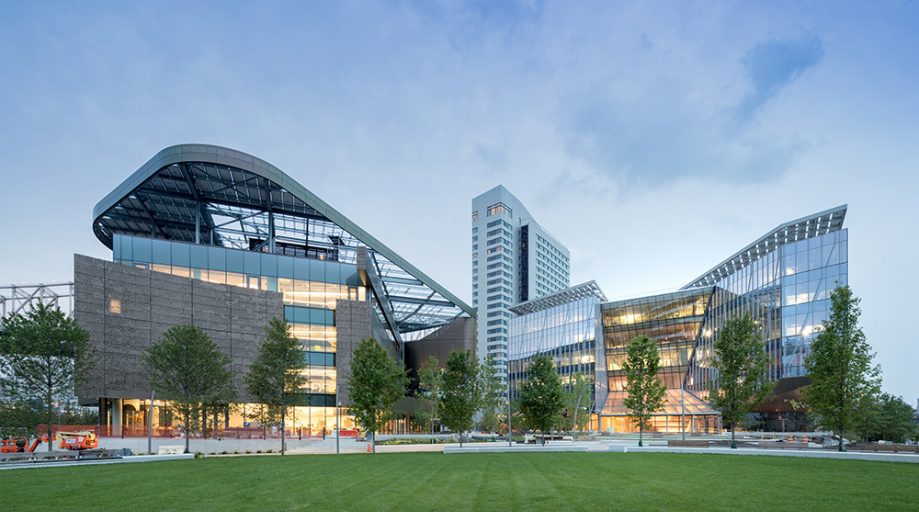Facebook COO Sheryl Sandberg Arrives at MIT, and More – Boston News

What’s happening at the best Boston business schools this week?
Asia Is Ripe For Investments. Here’s How U.S. Companies Can Capitalize – D’Amore-McKim Blog
The Northeastern University D’Amore-McKim School of Business recently published an overview of the recent Emerging Markets’ Symposium, in which Ravi Ramamurti, University Distinguished Professor of international business and strategy brought together seven CEOs and corporate executives to unpack the discussion topic, “On the Rise of Asia: How Should U.S. Companies Respond.”
Jimmy Weng, DMSB’07, and Credit Suisse’s current head of offshore investment strategies, told the audience via conference call that he believed “Asia’s economy is entering a “supercycle” of market boom.”
Symposium organizer Ramamurti said, “China is leading the way to a new era in globalization. The headroom for growth in Asia is very significant.”
You can read more about the symposium here.
Sheryl Sandberg On Facebook’s Missteps and What Comes Next – MIT Sloan Newsroom
Facebook COO Sheryl Sandberg delivered MIT’s 2018 commencement address last week and used her speech as an opportunity to come clean and share the lessons learned from her company’s recent Cambridge Analytica data mining imbroglio.
She told the audience, “It’s painful when you miss something — when you make the mistake of believing so much in the good you are seeing that you don’t see the bad. It’s hard when you know that you let people down.”

Sandberg speaking at the 2018 MIT commencement / Photo via Dominick Reuter
“The larger challenge is one all of us here today must face. The role of technology in our lives is growing — and that means our relationship with technology is changing. We have to change, too. We have to recognize the full weight of our responsibilities.”
You can read more Sandberg’s commencement speech and check out footage of the event here.
A Big Problem with Big Problems – Questrom Blog
Boston University Questrom School of Business associate professors Stine Grodal and Siobhan O’Mahony recently published a new study that explores how “competing and misaligned goals—combined with a lack of oversight—can derail an ambitious vision.”
In their paper “How does a Grand Challenge Become Displaced? Explaining the Duality of Field Mobilization,” Grodal explains how common “interest misalignment” can be when it comes to tackling big problems.
“The academic community might agree to focus on a grand challenge, but [individual] professors are also interested in publishing in top journals and funding graduate students, which can create misalignment between a grand challenge and a community’s existing goals.”
It’s also much easier to “develop advances in existing areas” rather than explore uncharted terrain. “People graft on to the grand challenge but are rewarded by the status quo, and end up pursuing goals that are closer to their existing work.”
Oversight is key to keeping researchers on track. Grodal notes, “With little overarching supervision, it shouldn’t be a surprise that communities found plenty of reasons to support their own missions more robustly than the mission of the grand challenge.”
Read the complete article and study here.
MIT Breaks Down Starbucks Response to Recent PR Nightmare, and More – Boston News

Let’s explore some of the most interesting stories that have emerged from Boston business schools this week.
What Starbucks Got Wrong—and Right—After Philadelphia Arrests – MIT Sloan Newsroom
Following Starbucks’ PR nightmare this past April in which an employee at a Philadelphia Starbucks had two African American patrons arrested after while they waited to conduct a business meeting, Starbucks announced it will host an afternoon of racial bias training for 175,000 employees across 8,000 of its locations.
MIT Sloan senior lecturer Roberta Pittore commended the coffee giant on the sincere response it made following the initial clumsy attempt to address the controversy in a generalized statement.
Regardless of the potential impacts a single afternoon of racial bias training might have on its employees, Pittore believes that “something is better than nothing, more is better than less, and sooner is better than later. I think what it does achieve from Starbucks’ point of view is that it changes the discussion from ‘What did our employee do that was offensive,’ to ‘How can we learn and how can we change?’”
You can read professor Pittore’s entire take on the incident and the Starbucks response here.
Two Northeastern Students Created an App to Revolutionize the School Bus Industry – D’Amore-McKim Blog
The Best Buy-sponsored E-Fest recently awarded $40,000 to BusRight, an app current D’Amore-McKim School of Business students Keith Corso, ’21, and Evan Eddleston, ’22, co-founded to “revolutionize the school bus industry.”
BusRight is designed to “track school bus passengers, current location, calculate optimal travel routes, curb carbon emissions, reduce transportation costs for bus companies, and improve quality of life for passengers, parents, and bus drivers.” According to the article, many school administrators and bus company officials have expressed interest in using the app.
Eddleston writes, “Bus drivers are home earlier, students are home earlier, and parents know where their kids are. It’s a much more efficient system than the one in place today.”
You can read more about BusRight here.
“Be Unreasonable” – Sawyer Business Blog
The keynote speaker at the Sawyer Business School 2018 commencement was Boston Foundation president and CEO Paul S. Grogan who received an honorary doctorate and shared some refreshing words of wisdom drawn from a lifetime of devotion to the betterment of communities.
“Powerful interests conspire to keep things the way they are. They’re fiercely resistant to change because they benefit from the status quo. [There is a] need for courageous public servants who can stand up to pressure and citizen activists who can reshape public opinion in their communities.”

Boston Foundation president and CEO Paul S. Grogan, speaking at this month’s Sawyer Business School commencement / Photo via suffolk.edu
Grogan advised graduates to think beyond the material success their prestigious degree will help them attain. “I implore you to volunteer, to vote, to donate to charity … but moreover to be an active citizen and fight for your fellow neighbors who don’t enjoy the full promise of an American life.”
You can read more highlights from Grogan’s lecture here and watch his speech in its entirety below.
MIT Talks to Costco CEO About Success, and More – Boston News

Let’s explore some of the most interesting stories that have emerged from Boston business schools this week, including a visit from the Costco CEO at MIT.
How Costco’s Obsession with Culture Drove Success – MIT Sloan Newsroom
Costco CEO James Sinegal, along with renowned Costco butcher Todd Miner, stopped by professor MIT Sloan Zeynep Ton’s “Management of Services: Concepts, Design, and Delivery” class earlier this month to discuss how Costco’s employee-focused culture was “critical to its success.”
In Ton’s 2014 book, “The Good Jobs Strategy,” she analyzed four “operational choices” that she believes Costco’s culture encapsulates—and are responsible for its status as a “wholesale giant.
- Offer less
- Standardize and empower
- Cross-train
- Operate with slack.
Sinegal explained that the key to Costco’s success is a culture that promotes “passion, integrity, ownership, and motivation in his employees and [ensures] that the customer can trust that they are always getting the best deal by shopping with Costco.”
He also highlighted the company’s well-known high-pay for its employees; among the best in the U.S. for retail workers.

“No one was going to be able to say we’re making money off the backs of our employees, because we were going to pay the highest wages in all of retail,” Costco CEO James Sinegal said.
Click here to get more insights from the Costco CEO.
The Evolution of Conflict Resolution – D’Amore-McKim Blog
Northeastern University D’Amore-McKim School of Business assistant professor Christoph Riedel recently published new research that offers insights into the social and biological evolution of how humans resolve conflict.
In “Conflict and Convention in Dynamic Networks,” Riedel researched how “dynamic networks allow individuals to resolve conflicts by managing their network connections rather than changing their strategy.”
His team applied computer simulations to common situations like when a single appetizer remains between a host and a guest. Riedel writes:
“Host-guest norms or ‘paradoxical behavior’ account for the vast majority of our simulated final state solutions—in other words, the host gives the guest the last appetizer. The opposite solution where the host takes the appetizer for himself, called ownership norms or ‘bourgeois behavior,’ is quite rare. This is especially interesting in the context of human biological behavior because in the animal kingdom, territoriality or ownership norms are ubiquitous.”
You can read more about Professor Riedel’s research here.
How Companies Can Use the Data They Collect to Further the Public Good – Harvard Business Review
HBS professors Edward L. Glaeser, Hyunjin Kim, and Michael Luca published a marketing piece in which they implored companies that collect data to recognize the possibility of “re-purposing their data for the public good,” which can allow companies to “do well by doing good.”
“[There is] broader potential for data from online platforms to improve our understanding of all of America. Just as Yelp can shed light on local economic changes, Zillow could inform our understanding of housing markets, LinkedIn could provide insight about labor markets, and Glassdoor could teach us about the quality of employment options in an area.”
You can check out the full article here.
Northeastern Prof Talks About Amazon Automation and Future Shopping

After the emergence of Amazon Go, a cashier-less convenience store the e-commerce juggernaut recently opened in downtown Seattle, Northeastern University’s D’Amore-McKim School of Business explored the potential impact of automation on the future of commerce.
The simple concept behind Amazon Go is a streamlined mini-mart experience in which customers “scan their smartphones with an app [and] grab what they want.” DMSB Associate Professor of Marketing Strategy and Managerial Decision-Making Bruce Clark discussed the implications of what New York Magazine dubbed the “automated 7-Eleven killer.”
“Unless you have an Amazon Go next door to your store, I’m not sure this is a big deal. It’s not clear to me the customer experience of an Amazon Go store is sufficient to make me walk past the local 7-Eleven. Geography is destiny in this sense: where you have more convenient stores, you will do well. A longer-term threat might be if Whole Foods went cashier-free and you had a Whole Foods next to your convenience store.”
Clark is quick to point out that AI more commonly automates pieces of jobs rather than entire gigs and cites the advent of the ATM in the late 1960s and ’70s as a key example.
“Despite widespread adoption of ATMs, employment of bank tellers increased over much of the past three decades. The driving factor was that while a given bank branch might require fewer tellers, that reduction in labor costs meant that banks could open more branches, offsetting the loss at any given branch. Tellers’ jobs in turn became more like that of a customer service representative rather than a paper- and currency-pusher.”
Clark remains cautiously optimistic about the future of retail, according to reports.
“The common thinking is that over time, human jobs will evolve toward processes at which humans remain better value, notably in emotional intelligence and physical dexterity. Retail employees will find their jobs increasingly specified in those terms. You’re either interacting with customers or efficiently managing the stocking and layout of a store. Employees who excel in these areas should be okay.”
But perhaps less so about the future of employment across the board. “All that said, I’m not sure any of us should be assuming we will have stable, well-paid employment in the future.”
Gear Up For These January MBA Deadlines

The next round of MBA admissions is swiftly approaching, with the eve of 2018 almost here. Time to mark those calendars!
New York City
The NYU Stern School of Business, Columbia Business School, and Rutgers Business School, Newark/New Brunswick are the big headliners when it comes to deadlines in the New York City metro in January.
The Forham University Gabelli School of Business, and the Syracuse University Whitman School of Management Online MBA program also have deadlines in the first weeks of the new year. Click here for more information on upcoming New York City metro deadlines.

The third round for application deadlines to Cornell’s Tech MBA on its new Roosevelt Island campus arrives January 10, 2018.
Los Angeles
The biggest Los Angeles metro business school institutions all have a slew of deadlines ready to pass within the first weeks of the new year, including the UCLA Anderson School of Management‘s full-time MBA, USC Marshall‘s part-time program, as well as the Claremont University Peter F. Drucker and Masatoshi Ito Graduate School of Management‘s part-time MBA.
Take a look at the coming deadlines in the Los Angeles metro here.
Toronto
Two Toronto metro schools have deadlines in early January, with the Ivey Business School full-time, Accelerated, and EMBA deadlines all falling on January 8, 2018. The second round deadline to the University of Toronto Rotman School of Management‘s full-time MBA also falls on January 8.
Take a look at the coming deadlines in the Toronto metro here.
Chicago
Two of the most prominent business schools in the entire Chicago metro—Chicago Booth and Northwestern Kellogg—feature a bevy of full-time, part-time, and Evening MBA deadlines before January 10. As well, the Quinlan School of Business at Loyola University’s full-time MBA for its annual spring intake arrives on January 15, 2018.
Just outside of the city, on the near border of Indiana, the Notre Dame Mendoza College of Business’ second round deadline for its full-time MBA program is set for January 9.
Get familiar with the coming deadlines in the Chicago metro here.

The second round of deadlines for the Northwestern Kellogg part-time and full-time MBA programs arrives on Jan. 10, 2018.
Boston
In Boston, the heart of America’s higher education, every January is a major month for several of the country’s most prominent MBA programs. Indeed, Harvard Business School and MIT Sloan, as well as the Questrom School of Business at Boston University, the Carroll School of Management at Boston College, and Northeastern University’s D’Amore-McKim School of Business all have MBA deadlines right at the beginning of the new year for various MBA programs.
Take a look at the coming deadlines in the Boston metro here.
For updated deadline information in Philadelphia, Washington DC, Baltimore, Atlanta, Dallas, Houston, Denver, San Francisco, San Diego, Seattle, and London, click here.
Philadelphia or Boston? Where’s the Best Place to Earn a Part-Time MBA

If you are interested in pursuing a degree in a diverse East Coast city, want to be surrounded by history and culture, and still immerse yourself in growing business community, two main cities come to mind: Philadelphia and Boston.
Both cities are at the center of U.S. history, and continue to be some of its largest centers of commerce and academia, with numerous opportunities to put its stellar education to work.
Surrounded by so many possibilities for professional development, an MBA student in a city like Philadelphia or Boston may not want to put their career and income on hold to pursue a full-time degree.
Thankfully, many of the business schools in Philadelphia and Boston offer part-time MBA programs, allowing students more flexibility as they kick off their careers in these exciting cities. But how to decide which one? We’ll take a look at some of the top part-time MBA programs in each metro to help you choose the right city for you.
Location
Once the capital of the United States, Philadelphia has never stopped being a center of both business and history since the time it played host to the country’s founding fathers. Home to some of the oldest and best universities in the country, Philadelphia has experienced a renaissance in recent years as young talent has become priced out of more expensive metros like New York City and Washington DC. The cost of living in Philadelphia remains fairly low, while the ever-growing business scene in the city offers the opportunity for high earning potential. This year, 14 Philadelphia-area companies made the Fortune 500 list.
Like Philadelphia, Boston has been a center of commerce and trade since the days of the Boston Tea Party. Today, the city is home to nine Fortune 500 companies, including major established firms like GE (13th on the Fortune 500 list) and newer but thriving businesses like Wayfair. However, Boston has a much higher cost of living than Philadelphia. The city currently ranks as the third most expensive city in the country.
Programs
Between the Wharton School of Business and the Harvard Business School, Philadelphia and Boston offer two of the most highly regarded MBA programs in the country. However, both of these schools only offer full-time MBA programs. Students looking for more flexibility in their schedules still have a number of stellar programs to choose from.
Most of the part-time MBA programs in the Philadelphia metro work on a hybrid structure, allowing students to take a combination of classes both online and in person. Many programs also offer students the chance to select majors or concentrations in which to specialize their business education. With a variety of possible concentrations at some of the most highly-ranked part-time programs in the country, students from these programs have gone on to find employment at major firms like DuPont, KPMG, and JPMorgan Chase.
Part-Time MBA Programs in Philadelphia Include
- Lehigh University College of Business and Economics
- Fox School of Business – Temple University
- La Salle University
- LeBow College of Business – Drexel University
- Lerner College – University of Delaware
- Rohrer College of Business – Rowan University
- Rutgers School of Business, Camden
- Villanova School of Business
- West Chester University
Like Philadelphia, Boston’s part-time MBA programs offer more flexibility for students to complete their degree on their own time. Most courses are offered in the evening or on weekends, and can be taken over the course of just two years or up to seven. Programs like the MBA at D’Amore-McKim also give students the opportunity to concentrate in fields such as Corporate Finance, Corporate Renewal, Entrepreneurship, and more.
Part-Time MBA Programs in Boston Include
- Carroll School of Management – Boston College
- D’Amore-McKim School of Business – Northeastern University
- F.W. Olin Graduate School of Business – Babson College
- Questrom School of Business – Boston University
- Sawyer Business School – Suffolk University
- Simmons School of Management
Cost
The tuition costs can vary from program to program, and can also be cheaper if the part-time program is competed online. On average, programs in the Philadelphia metro area can range from $45,000-$65,000 for the degree. The range of costs in Boston can be slightly higher, with some students spending up to $95,000 over the course of their degree.
Jobs
Although the cost of an MBA in Boston may be slightly higher than Philadelphia, the difference in average salary between the two cities may even out concerns of cost. In Boston, the average salary for someone with an MBA degree in a field like finance is $112,000, whereas in Philadelphia it is only around $90,000 per year.
